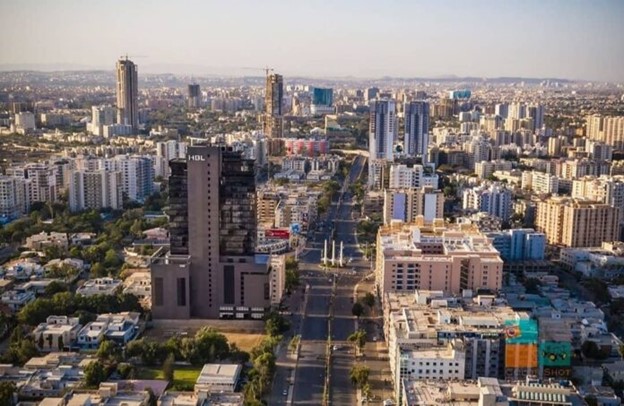The world has been rushing to contain the threat of climate change. Countries are taking drastic changes to secure their futures. However, such changes sometimes result in the economy’s stagnation, especially for those countries that employ a more traditional approach to their industrial system.
Pakistan is a country that does not rank high globally in terms of greenhouse gas emissions, primarily due to a semi-industrialized economy, but this does not stop it from becoming one of the most vulnerable countries to climate change. Unlike China, the EU, or the USA, Pakistan does not have a very strong economy, and the threats posed by climate change are much more significant. The government, therefore, is trying to avert a large-scale humanitarian disaster even if it means painfully reforming the economy.
Threats Faced by the Country:
Pakistan employs 30% of its workforce in agriculture. Rice and cotton are among the country’s highest exports. Therefore, a sudden change in the climate is bad for the agricultural industry and the country as a whole. Pakistan was supposed to be going through an industrial boom, but climate change has put barriers in its path. Embracing modernism with green values is not an easy task for developing countries. But, also, they have little choice to shy away from it.
- Deforestation:
This is a major issue in Pakistan. A country of more than 200 million people has a very high resource consumption rate. The increased demand for wood gives rise to illegal logging, leading to all kinds of natural disasters such as land sliding.
- Melting of ice-capped mountains and glaciers:
The rapid destruction of the Hindu Kush glaciers could impair the Indus river system, which is the most crucial artery of water in the entire country. Before the drying, the river system could witness overflowing, which could consequently lead to the destruction of lands and triggering a mass displacement of people.
- Water scarcity:
As temperatures touch record highs and rains become rarer, the overall water availability is impacted, leading to all kinds of problems such as worsening sanitary conditions, decreased land arability, and increased prevalence of heat strokes.
- Creation of climate refugees:
Probably the worst consequence of climate change is the displacement of people. Pakistan has already witnessed mass migrations in the past due to flooding. While the government has found temporary solutions by permanently relocating the masses and building stronger barrages, if the underlying problem remains unresolved, such incidents can happen again.
How are the government and society responding to these challenges?
The government of Imran Khan has so far been one of the most environment-conscious governments in Pakistan’s history, spearheading legislations, promoting green energy, and advocating for plantation drives throughout the country. The government even recognized and publicly campaigned on the water scarcity issue caused in part by climate change. However, critics argue that they aren’t really serious about climate change, especially when it comes to Chinese investments. The government does try to play down the impact of multimillion projects on the environment. Here are some of the positive things we’ve seen in the past few years concerning climate change and the environment.
- Better water storage and distribution:
Throughout the years, numerous dams and barrages have been planned and built; while these dams do come with an environmental cost as the natural ecosystems are damaged, they are indeed an effective way to make full use of the water available. Under its Belt and Road initiative, China is also eager to invest in the hydroelectric infrastructure of Pakistan as the natural water system of the country promises good investment opportunities. As mentioned earlier, dam construction does however cause environmental issues as a lot of the surrounding land is submerged due to the creation of artificial lakes. But, barrages and dams give the government control over water flow, which can avert the disasters caused by uncontrollable flooding of the Indus River.
Piping has also been a major concern in urban centers. A good amount of water is lost due to leaky pipes and water theft due to chronic water shortage in certain areas. The local bodies have tried to crack down on water theft, but the crackdown will only be a short-term solution until the systemic problem is not resolved.
- Transition to renewable energy:
Developing countries increasingly rely on energy from fossil fuels because of the high cost of green energy and reliability issues; therefore, the rapid transition from fossil fuels to renewable energy in Pakistan is supported by the government, which otherwise would’ve been incredibly difficult. In 2017, a year before Khan’s election, the government of Pakistan created a new energy policy under the Alternate Energy Development Board to allow people to sell energy back to the government if they have means of solar and wind energy production. This was a huge step as the rising electricity tariffs and the promise of reward in the form of financial compensation encouraged more homeowners to switch to self-production of electricity, mainly through solar panels. Multiple energy projects such as the Jhimpir Wind Farm and the Bhawalpur Solar Farm are already operational. Pakistan has a handful of arid areas and has little to no rainfall, where the sun shines brightly without any significant cloud cover. Researchers and even independent investors are keen to use the terrain and the numerous opportunities it offers in renewable energy production.
- Electronic Vehicle Policies:
The Ministry of Science and Technology has devised a plan to reduce daily car emissions by substituting regular vehicles with EVs. This is a gradual process, though by 2040 the ministry aims to replace 90% of the traffic with EVs. However, concerns have been raised about the sustainability of this idea since it leads to chronic electricity shortages if the demand increases rapidly. All new mass transit projects in Karachi are currently being commissioned with national climate goals in mind. The Karachi Green Line Bus Rapid Transit System (BRTS) is a 22 km long mass transit system consisting of hybrid battery-powered buses. Moreover, the soon-to-be-constructed Redline will use biofuel as a means of power, completely switching from the traditional fossil fuels. Another project, the Karachi Circular Railway, used to run on polluted diesel-powered trains. The reformation of the project includes transitioning the trains from diesel to electricity, thereby removing the polluting factor.
- Mass plantation drives:
Throughout Pakistan, mass plantation drives are underway, supported by both the federal and provincial governments. Among them, the most renowned plantation drive was the “Billion tree tsunami,” which made headlines globally and was even lauded by the World Economic Forum (WEF). Since the success of the billion tree tsunami, many other identical projects have begun all across the country, most of them focusing on the self-sustainability of the economy. For example, Pakistan imports millions of olives from established markets such as Italy and Spain, but now the agricultural ministry is allotting more arable land to farm olives locally. According to reports, currently, the land dedicated to olive farming is way more than in Spain, which is among the highest producers and exporters of olive. Similarly, startups experimenting on techniques to recycle garbage into compost are also on the rise, hitting two birds with one stone by not only solving Karachi’s garbage problem but also producing extremely low-cost compost for plantations.
“At Botanical K-Town, we exercise organic waste generated from households and businesses to put that waste through the composting procedures” –Mustafa Khan, founder of Botanical K-Town.
If everything is positive, then why is the government being criticized?
While the government has generally supported green policies, disappointingly, it has bowed down repeatedly to investments from abroad, including such investments that are anything but environmentally friendly. One example is the Bundle Island project, a multimillion-dollar project that was to be commissioned in one of Karachi’s uninhabited islands. While the project was relatively healthy for the economy, it came with an environmental cost. The project’s construction would destroy several acres of Karachi’s mangroves, which act as a natural barrier against high tides, prevent soil erosion, and is a breeding area for many native species of sea animals. While the government was ready to move the project forward, environmental activists, local fishermen, and the provincial government of Sindh gave strong arguments against it, subsequently stalling the project. Other than that, Chinese investments in the Thar coal power projects come with a substantial environmental cost even though the government has labeled it “clean coal.” Although the Thar project has upgraded the country’s electricity production massively, the environmental costs are ignored, which could affect the country negatively in the long term.
Therefore, the government’s pro-environment measures are indeed worth appreciating but it has to be unbiased when viewing the impact of investments on the environment. Otherwise, there would be no major long term change to the already dire situation.




